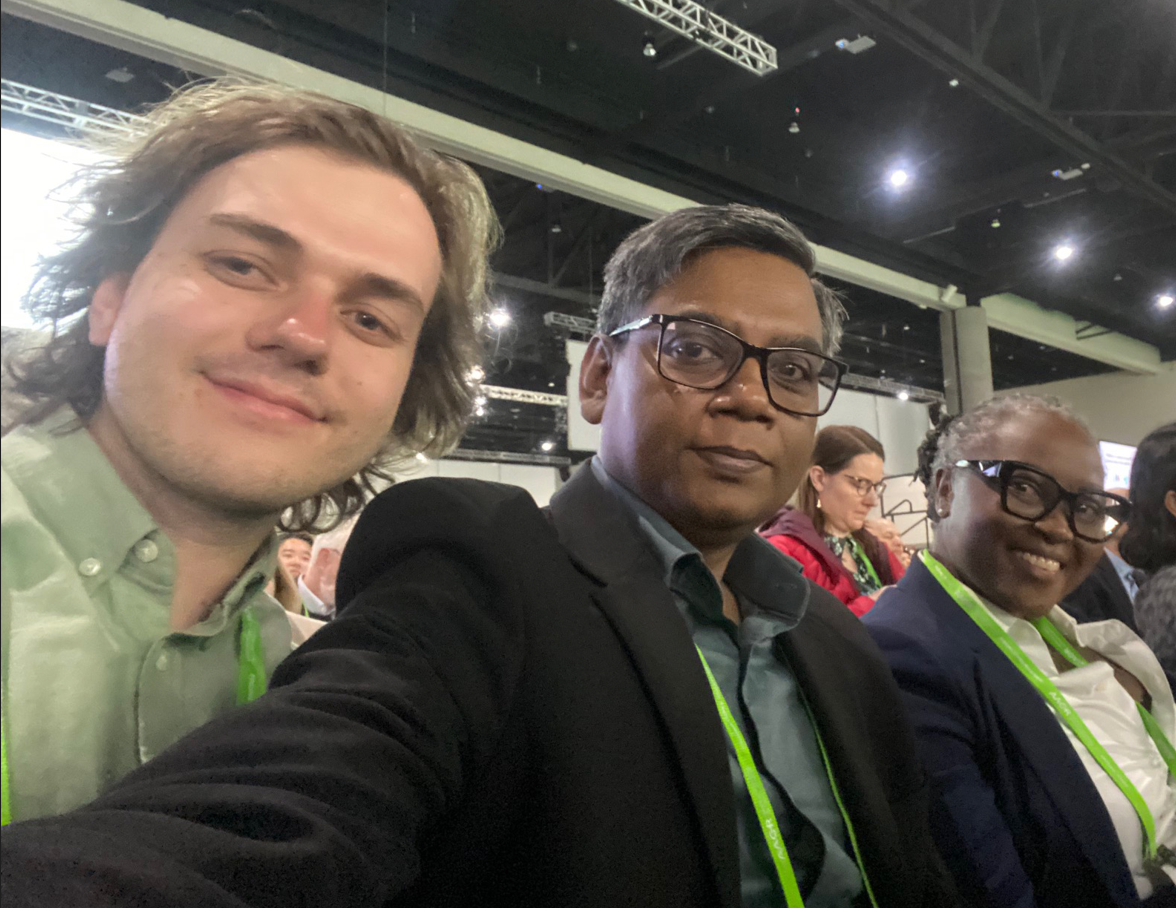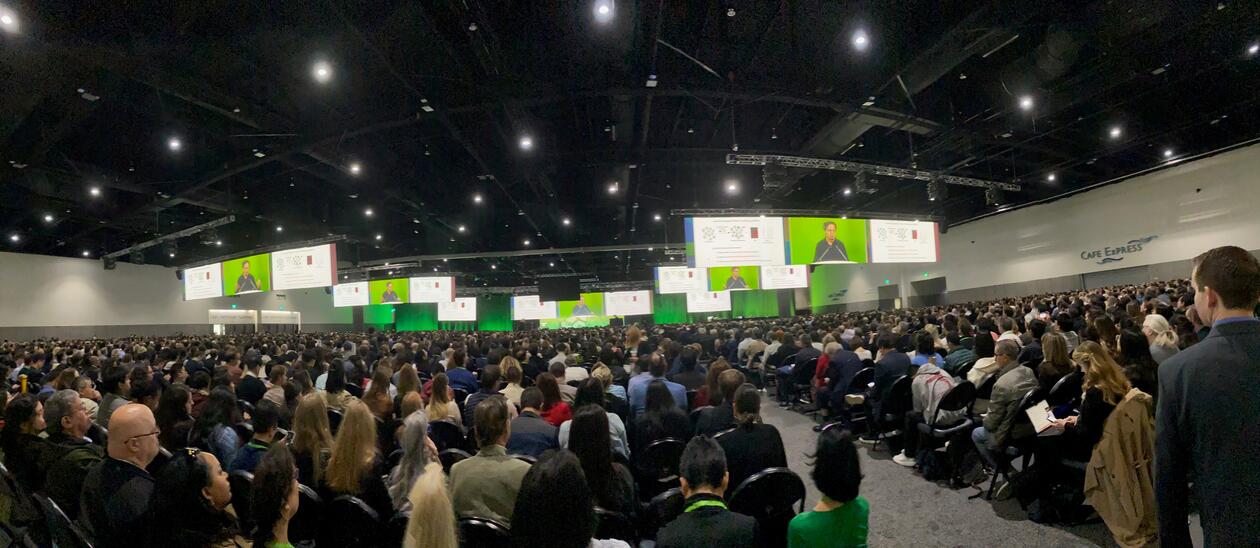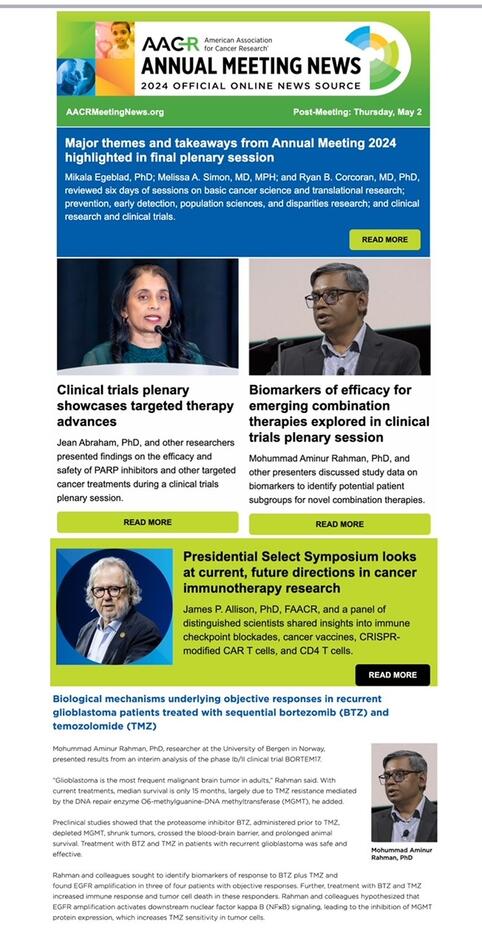American Association for Cancer Research (AACR 2024) April 5-10, 2024
It was a great privilege to participate at ‘AACR Annual Meeting 2024’, a large and important conference for cancer research, the place where scientists, clinicians, survivors, and patients, gather to share and discuss the latest breakthroughs.
Main content
Professor Martha Chekenya (group leader), Dr. Aminur Rahman and PhD student Lasse Neset from Brain Tumor Immunology and Therapy group attended this year´s American Association for Cancer Research (AACR) annual conference that was held in San Diego, USA, April 5-10, 2024. We are grateful to the Norwegian Cancer Society and KLINBEFORSK who made this possible.
This year’s theme “Inspiring Science, Fueling Progress, Revolutionizing Care” galvanized 23,200 participants from 78 countries. There were over 240 clinical trial presentations, including 24 Phase III studies for improving cancer treatment. The buzz word was Bayesian algorithyms for adaptive clinical trial designs– multiple arm designs, moving away from rule based to modern strategies that allow flexible sample size e.g. allow assaigning less or more patients to effective or toxic arms along the way as well as designs that integrate both toxicity and efficacy endpoints. Biomarker profiling for personlised trial designs was a major focus point e.g. liquid biopsy monitoring ct-DNA and molecular biomarkers. There was also a great push for diversity- increasing representativeness of patients participation in clinical trials, but also among clinicians to enhance relevance and impact /trust of communication with the diverse patient groups.
A significant attention was drawn to the cutting-edge technologies, including artificial intelligence: deep learning and single cell genomics/transcriptomics, as well as use of geneology to track cancer development. Deep Learning to understand tumor complexity by integrated analysis of medical images data science and radiomics AI e.g. integrating spatial imaging and next generation omics data to predict immune cell signatures, predict inhibitors that may enhance therapy, identify new target or data driven vs mechanistic mathematical modelling was a major focus.
There were several chemistry to clinic sessions highlighting novel designs e.g. antibody drug conjugates (ADCs) by choosing the right target, linker, conjugation technique, novel payloads, and new targets. Chemical biology approaches were discussed to tackle undruggable targets including transcription factors and targeting aberrant transcription, as well as emerging therapeutic modalities in protein degradation by molecular glue degraders and proteolysis targeting chimeras (PROTACs).
Presentations on novel immunotherapeutic approaches, including new checkpoint inhibitors, CAR-T cell therapy, and cancer vaccines, as well as updates on clinical trials and combination therapies. A new concept of “triad activation “ was introduced that goes beyong the traditional immunoscore. Discussions on personalized treatment strategies based on genetic profiling, liquid biopsies, and other molecular diagnostic techniques to tailor therapies to individual patients.
Advances in brain tumor research: There is some progress but mostly for low grade gliomas or those harbouring mutations in IDH (INDIGO trial[1]); BRaf and H3K27M (ONC201[2]). For GBM, targeting ATM in the DNA damage pathway with AZD1390 small molecule inhibitor in phase-I or window of opportunity trials offers a glimmer of hope.
[1] Vorasidenib in IDH1- or IDH2-Mutant Low-Grade Glioma
Authors: Ingo K. Mellinghoff, M.D., Martin J. van den Bent, M.D., Deborah T. Blumenthal, M.D., Mehdi Touat, M.D., Katherine B. Peters, M.D., Jennifer Clarke, M.D., Mellinghoff, I.K et al., Joe Mendez, M.D., +23, for the INDIGO Trial N Engl J Med 2023;389:589-601
[2] Clinical Trial Neuro Oncol, 2024 May 3;26(Supplement_2):S173-S181. A randomized phase 3 study of ONC201 (dordaviprone) in patients with newly diagnosed H3 K27M-mutant diffuse glioma
Arrillaga-Romany, I et al.



